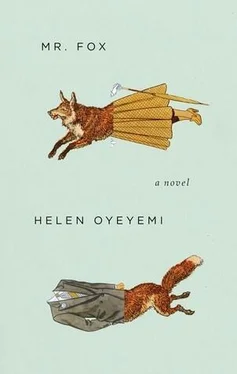Except once, when she almost went back to see.
Except once, when she woke up one morning convinced that she was in love. All over her, her skin felt softer even than her breath, and her eyes felt wider, clearer, dreamy, lashed and lidded with an unknown stuff that had drawn a man in. For a week, she washed and dried and rubbed cream into her body with a special, happy care, and she realised that she was preparing her body for caresses. She found a taste for cold things that released their sweetness slowly — ice cream that slid down her throat before she could taste it, tinned peaches in chill syrup.
But there was no heart there in her chest.
When the girl remembered this, she forced herself to eat a bite of mashed plantain, and the first swallow was hard. But after that, life stepped straight again.
The man’s new mother told him, “That heart, that heart in the shrine, it’s the heart that we must take for my collection.” And then the art collection, the beautiful woman, the new mother’s obsession, would be complete. “If only we can locate the heart and take it with us,” the man’s new mother said, watching her new son closely.
The heart had told him, it had called to him, Come. Take from me, I am inexhaustible.
But the man said nothing.
“I know that you know where that heart is,” the man’s new mother said, and she bared teeth as sharp as daggers. “You are a seeker, you find things. Bring it to me.”
The man told his new mother to give him five days. He ground valerian root into her tea to make her sleep, and the new mother slept with a beauty like rose and earth, and her bitterness was a weed whose roots were scourged by her sleep, and so her bitterness fell away.
The man moved the collection, in carefully packaged batches, to the Osogbo shrine. It was a cry to the owner of the heart, this offering; he would not take the heart from the walls of the shrine until she came. He looked at all the love carved into the stone, and it was a lot of love, and he believed that it must be enough; he had to believe that it was enough. He arranged the fragmented woman as best he could, and sometimes he felt as if unseen hands helped him, propped a canvas in such a way that the light enhanced it. The man was desperate now, and he asked the heart to call to its owner, for she was the strength that he had somehow been born separately from.
The heart called.
The heart called.
The man called.
The gathered woman, scattered across sculptures and glass and photographs and scraps of paper, the gathered woman became complete and almost breathed.
Almost.
The man waited for five days. He thought that he must surely die under the sun and the pain of this disaster. But he didn’t die, because the shrine stones protected him.
When on the sixth day the man saw that the heart’s owner did not come, he left that place.
Idon’t think my husband likes me. And I don’t know how to make him. I try talking to him about books, and when he replies he won’t look me in the eye, and sometimes his voice is muffled, suppressing a coughing fit. . or laughter. I think it’s important to be able to laugh at yourself — I hate people who are always offended. But when you’ve got to be prepared to laugh at yourself every single time you open your mouth. . well, that’s just depressing. I asked Greta for advice and she gave this tiny scream, as if she’d just heard the funniest words ever uttered, and she said, “Oh, did you marry him for the intellectual conversation? You didn’t even finish college, Daphne.”
I took her point, even though it was unfair of her to bring that up. College was a near-fatal bore. I had some really serious nosebleeds just at the thought of going to lectures. Gush, gush, gush, and afterwards I had to sit still for a couple of hours on account of having lost a lot of blood — doctor’s orders. Philosophy! I must have been crazy. I only did it because they told me at school that I was smart, and gave us all these thrilling speeches about the privileges and responsibilities of women in higher education. I can learn things all right; I don’t deny that I can learn things. But I can only learn them when it isn’t important. If someone tells me something and then says, “Well, you’d better remember that, because in three months’ time I’m going to make a decision about you based on whether you’ve remembered or not,” then it’s all over and there’s nothing I can do about it. Pops says he loves me just the way I am, but not everyone in the world is like my father. Maman, for example. A difficult and dissatisfied woman. She made me learn flower arranging and how to walk properly — books on my head, the whole bit. These things ruined me for life. Now it sets my teeth on edge when I see flowers carelessly flung into a vase, and I’m forever looking at other women in the street and thinking, Sloppy. . sloppy. And I know I shouldn’t care, and I want to poke myself in the eye for caring, but I care anyway, so thanks for that, Maman. I guess most mothers are difficult and dissatisfied, though. I haven’t heard of any easygoing ones, unless they’re dead and everyone’s being nice about them. But even then they don’t say, “She was real easygoing,” they talk about her sacrifice and how she had time to get involved in everyone’s business. Anyway. My mind is wandering. I know that’s because I’m thinking crazy thoughts and I don’t want to be thinking them. I liked St. John because he’s different from the boys I grew up with. Nothing like John Pizarsky or Sam Lomax; they just shamble around like they always did, only in nice clothes they buy for themselves now. I can’t take them seriously. Now, St. John could have been born into his elegance. It’s a dangerous kind of elegance — he doesn’t raise his voice, he lowers it. Sometimes he says something funny, and when I laugh he looks at me and asks what I’m laughing at, as if he’d genuinely like to know. And he’s a solitary type. . But when he comes back from wherever he’s gone he can look so glad to see me. .
Ordinary life just swerves around him, though, and I run off the sides like an ingredient thrown in too late. I can’t stand the way he talks to me sometimes: very simply, as if to a child. The other day I suddenly realised, mid-conversation, that we two had spoken of nothing that morning but the matter of whether we ought to have calling cards made up for ourselves, to be left for friends who chanced not to be at home when we visited. Are calling cards too old-fashioned, he wondered aloud. And what is the correct design and texture, and should we be Mr. and Mrs. Fox or St. John and Daphne Fox, our names linked in the middle of the card or printed on separate sides of the card. He told me to consult my Emily Post, but I said I didn’t have any of her books. He looked kind of surprised (I have several editions), but I lied because I don’t like him thinking that these are the only things that interest me. The way he talks to me. I thought it was just his manner — I didn’t mind that he never said anything romantic, not even at the very beginning — I was relieved about never having to wonder whether he really meant what he was saying. But now I’m starting to worry that this simplicity is contempt, that he picked me out as someone he could manage. I don’t like to give that thought too much air, though. It’d be hard to go on if I really thought that was true.
I wish there was some level ground I could meet him on. Say he liked baseball, I could educate myself about that quite easily, just hang around while my dad and my brothers are waxing lyrical. That’s easier than books. With books you’ve got to know all about other books that are like the one you’re talking about, and it’s just never-ending, and it’s a pain. But this situation is fifty percent my fault. When I was a lot younger, maybe fourteen or fifteen, I had ideas about the man I wanted. I remember a piano piece my music teacher played as part of a lesson. It was the loveliest thing I’d ever heard. People talked and passed notes all the way through it, and I wanted to shut them up at any cost, just go around with a handful of screwdrivers, slamming them into people’s temples. I waited until everyone had gone. Then I laid my notebook on top of the piano the music teacher had closed before he’d walked away, and I wrote his name, wrote his name, wrote his name, and underlined each version. I vowed that I wouldn’t have a man unless he was someone I could really be together with, someone capable of being my better self, superior and yet familiar, a man whose thoughts, impressions, and feelings I could inhabit without a glimmer of effort, returning to myself without any kind of wrench. Music. Sometimes it just makes you want to act just anyhow. I wasn’t in love with the music teacher; I wrote his name because it was a man’s name.
Читать дальше












